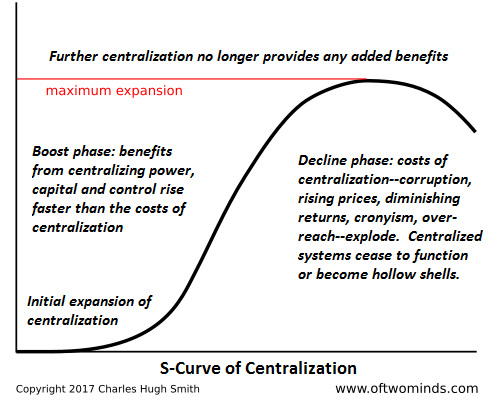The "marketplace" of individuals and entities all seeking to maximize their share of the central-state swag doesn't make a democracy.
A democratic republic is a government in which power flows from citizens to their elected representatives. The American revolutionaries did not make a big distinction between republic and democracy, for in the context of the late 1700s, the dominant political structure was monarchy, and democracy meant the people have the final say via elections.
As Gordon Wood explains in his seminal book
The Radicalism of the American Revolution, the upper-class revolutionaries had their doubts about the rabble's ability to pursue the common good above their own narrow self interests. This ability to focus on the public good rather than on one's own financial interests was widely understood to be the make-or-break dynamic of a durable democracy: without a class of citizens who could set the public good above their own interests, democracy would fail and be replaced by a neofeudal system of patronage in which loyalties followed a hierarchy of self-serving privilege.
In other words, precisely what we have today in the USA.
The revolutionary founders understood that only financially independent citizens had the wherewithal to put the public good above their own private interests. Those who were dependent on a powerful individual or organization would have no incentive to put the common good above their own share of the swag, and every incentive to support their patron (individual, corporation or government program) at the expense of the common good.
How many citizens are truly financial independent in America today? How many don't depend on a wealthy individual, corporation or government program for their livelihood and financial well-being?
What incentives are present that would cause a dependent to vote against the narrow interests of their patronage? Very few if any.
The number of financially independent citizens is very low in a neofeudal economy dominated by centralized government, cartels, corporations and a super-wealthy financial nobility-- the latter three (cartels, corporations and financial elites) being just as obsessed with maximizing their share of government swag (tax breaks, subsidies, sweetheart contracts, etc.) as any welfare dependent.
As a result, politics in America has decayed into an endless free-for-all of parasitic elites and dependent constituencies squabbling over their share of the federal swag.
The public good is given lip service but everyone knows patronage and dependence are the dominant dynamics of our society and economy. How can an elected official who must spend half their time raising millions of dollars from corporations and wealthy elites have any real conception of the public good? How can voters who approve every "free" benefit and financial "right" that will flow to their account have any real measure of the public good?
The "marketplace" of individuals and entities all seeking to maximize their share of the central-state swag doesn't make a democracy. They are merely a rabble fighting over the bread and circuses issued by an empire that seeks to placate and distract a citizenry and commercial elite that has lost all sense of public good beyond "free" patronage.
Time will reveal that nothing is truly free, including democracy and the public good. Those dependent on central state patronage will discover that centralization has entered diminishing returns on its way to dissolution and ruin.
NOTE: Contributions/subscriptions are acknowledged in the order received. Your name and email remain confidential and will not be given to any other individual, company or agency.
Thank you, Darren B. ($200), for your beyond outrageously generous contribution to this site -- I am greatly honored by your steadfast support and readership.
| |
Thank you, Larry T. ($150), for your beyond outrageously generous contribution to this site -- I am greatly honored by your steadfast support and readership.
|



























